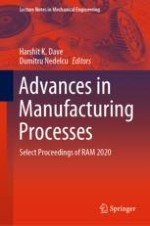2021 | OriginalPaper | Buchkapitel
Analysis of TIG-Welded Aluminum Alloys During Single Point Incremental Forming at Different Wall Angles
verfasst von : M. M. Ghadmode, Arpit R. Patil, B. U. Sonawane, Amrut Mulay
Erschienen in: Advances in Manufacturing Processes
Verlag: Springer Singapore
Aktivieren Sie unsere intelligente Suche, um passende Fachinhalte oder Patente zu finden.
Wählen Sie Textabschnitte aus um mit Künstlicher Intelligenz passenden Patente zu finden. powered by
Markieren Sie Textabschnitte, um KI-gestützt weitere passende Inhalte zu finden. powered by
